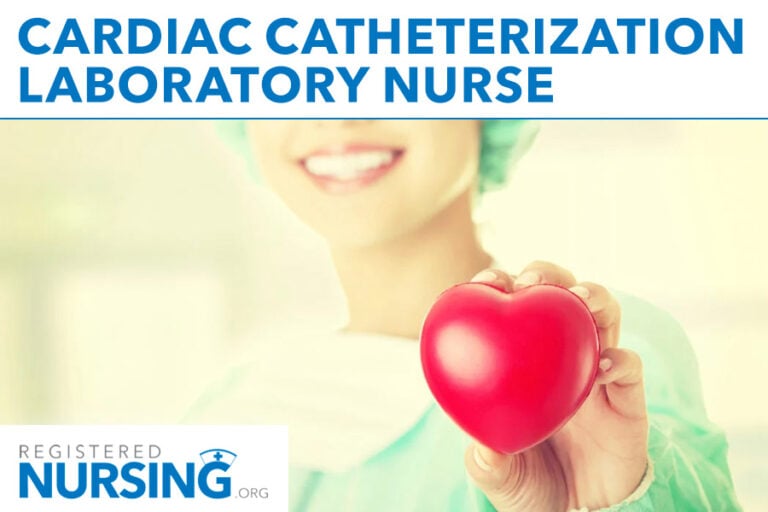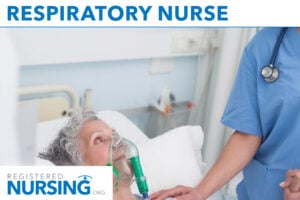Cardiac Catheterization Laboratory Nurse

What is a Cardiac Catheterization Laboratory Nurse?
Typically only available in large hospitals and clinics, and open only to nurses with suitable credentials and practical experience in a specialty role, the Cardiac Catheterization Laboratory Nurse must be a patient-care specialist in all aspects of the Cardiac Catheterization laboratory or Cath Lab. The role does vary, but commonly, the Cath Lab nurse assists the Cardiac Interventionist in performing diagnostic and therapeutic percutaneous coronary intervention (PCI) on patients with heart disease and defects. PCI helps to diagnose and treat myocardial infarction and typically includes placing stents to coronary arteries. Closely monitoring the patient for improvement or complications, administering medications including conscious sedation, and assisting the Interventionist are some of the tasks of this role.
How to Become a Cardiac Catheterization Laboratory Nurse
Becoming a Cardiac Catheterization Laboratory nurse involves rigorous post-licensure training and clinical experience. The most competitive candidates are ones that have a breadth of experience as a nursing generalist, coupled with a drive to promote public awareness of signs and symptoms of cardiovascular disease and advocate lifestyle modifications to reduce risk disease markers. Candidates will show aptitude and diligence to increase early detection of vascular disease, as well as actively promote a lifestyle to help patient outcomes in the vascular unit.
What Are the Schooling Requirements for a Cardiac Catheterization Laboratory Nurse?
At the minimum, Cath Lab nurses require an Associate’s Degree in Nursing (ADN) diploma from an accredited nursing school coupled with the successful completion of the NCLEX-RN exam, which will allow you to become fully licensed as an RN. Nurses are required to be in good standing with the state Board of Nursing and have clinical experience on the nursing floor. Today, most candidates often possess a Bachelor’s of Science in Nursing (BSN) degree to remain competitive for job opportunities, and many healthcare employers prefer BSN-educated RNs.
RELATED: Find out how to become a Cardiology Nurse Practitioner.
Are Any Certifications or Credentials Needed?
The following credentials and experience are listed here to give candidates and those interested in becoming CCL nurses the best opportunities for professional development prior to the required certifications. While not universally required, nurses who have a number of relevant credentials may stand a better chance when it comes to getting hired.
- Basic Cardiac Life Support (BCLS)
- Advanced Cardiac Life Support (ACLS)
- Critical Care Registered Nursing credentials (CCRN)
- ICU Competency exam with a score of 80% or higher
- Minimum two years of experience in acute care
- Minimum two years of experience in cardiology
- Proficiency in cardiology nursing procedures and skills, including cardiac dysrhythmia interpretation
- Knowledge of cardiovascular anatomy, physiology, hemodynamic, and rhythm interpretation
Having achieved some or all of the prerequisites and professional development, nurses may then apply to the Cardiac Vascular Nursing Certification (RN-BC) program offered by the American Nurses Credentialing Center (ANCC). RN-BC certifications must be renewed every five years. Practical experience is best obtained through the cardiac cath lab training program through your employer. Programs are intense and last about 6 months, depending on the hospital and state where you’re located. Once certified, you’ll be a competitive candidate for the Cardiac Catheter Lab position.
| Certification | Full Name | Length of Certification | Key Differences |
| CCRN (Adult) | Critical Care Registered Nurse (Adult) | 3 years | Focuses on the care of critically ill adult patients, including those with cardiac conditions; requires experience in critical care. |
| CSC | Cardiac Surgery Certification | 3 years | Specialized in caring for patients recovering from cardiac surgery; requires experience in post-operative cardiac care. |
| CMC | Cardiac Medicine Certification | 3 years | Specializes in the care of patients with acute or chronic cardiac conditions, excluding surgery; focuses on medical management of cardiac patients. |
| CVRN | Cardiovascular Nursing Certification | 4 years | Broad certification covering various aspects of cardiovascular nursing, including prevention, treatment, and management of heart disease. |
| CEPS | Certified Electrophysiology Specialist | 3 years | Focuses on the care and management of patients with arrhythmias and other electrophysiological disorders; requires specialized knowledge in electrophysiology. |
| CHFN | Certified Heart Failure Nurse | 4 years | Specializes in the management of patients with heart failure, including education, treatment, and patient support. |
What Does a Cardiac Catheterization Laboratory Nurse Do?
The Cath Lab nurse assists the Cardiac Interventionist in performing diagnostic and therapeutic interventions. He or she closely monitors the patient for complications, administers medications including conscious sedation, and assists the Interventionist.
What Are the Roles & Duties of a Cardiac Catheterization Laboratory Nurse?
- Assist with cardiac catheterization and electrophysiology procedures
- Assist with other procedures, both diagnostic and interventional in nature, such as angioplasties, implants, pacemakers, and diagnoses of cardiac conditions
- Administer and monitor patient sedation to moderate levels
- Monitor and annotate patient vital signs
- Monitor for signs of infections or procedural side effects
- Provide emergency intervention if patients experience bleeding or serious side effects from procedures
- Administer patient medications
- Update patient charting according to clinic and professional best practices
- Manage and communicate regarding pre-procedure patient preparation
- Manage and communicate about post-procedure processes, including recovery and outpatient appointments
- Manage administrative aspects of cardiac catheterization and electrophysiology patients
- Provide instruction to patients and families before discharge regarding medication, lifestyle, activities, and care of the surgical site
Where Do Cardiac Catheterization Laboratory Nurses Work?
Typically found in hospital settings, the Cath Lab nurse may also work some shifts in the outpatient clinic environment. Shifts are commonly 8 or 10 hours on the hospital floor, 4-5 days a week, with the option for on-call hours as well. Some hospitals offer the typical 12-hour, three-day-a-week shift common to other nursing roles.
RNs with cath lab training may also wish to work on the research side, conducting and assisting with clinical trials related to cardiac interventions.
Cardiac Catheterization Laboratory Nurse Salary & Employment
The median salary of a Cath Lab nurse is about $140,603, though salary does range from $117,000 to $187,000. Factors that may affect salary include experience, level of education, additional certifications, city/state, and whether you’re in a rural or urban locale.
Cardiac disease is still responsible for about a quarter of deaths in the United States – a multifactorial problem, and there is a great demand for nurses to help patients meet and overcome these challenges. With current rates of sedentary behavior and the Western diet, there is a definite demand for cardiac catheterization lab nurses.
| Average Annual Salary | |
| Lowest 25% of Earners | $117,000 |
| Median | $140,603 |
| Top 25% or Earners | $163,000 |
| Top Earners | $187,000 |
Cardiac Nurse FAQs
The cardiac care nurse and cardiac catheterization laboratory nurse both require advanced knowledge of the different heart rhythms. In both roles, you are required to use electrocardiography equipment frequently.
A cardiac care nurse provides direct care to the cardiac patient population and assists in the treatment of a variety of complex cardiac diagnoses. Responsibilities include caring for patients, both pre and post-cardiac surgery. They also provide care to patients experiencing moderate to severe symptoms related to cardiac disease.
A cardiac catheterization laboratory nurse assists with the different cardiac procedures in the cath lab, ranging from basic diagnostic procedures to more complex interventions. Responsibilities include pre-op preparation of the patient, along with recovering patients directly after their procedures. They also provide education to the patient and family members regarding their treatment plan.
Helpful Organizations, Societies, and Agencies
- American Association of Cardiovascular and Pulmonary Rehabilitation
- American College of Cardiology Foundation
- American Nurses Association, Society for Vascular Nursing
- Journal of Cardiovascular Nursing
- European Journal of Cardiovascular Nursing
- British Journal of Cardiac Nursing
- Progress in Cardiovascular Nursing








